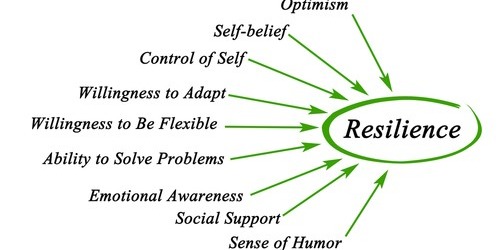Emotional resilience is not about winning the battle. It is the strength to power through the storm and still keep the sail steady.
Living in the era of technological revolution, every ten years we adapt to changes that never existed in our life before.
In a broad way, emotional resilience means bouncing back from a stressful encounter and not letting it affect our internal motivation. It is not a “bend but don’t break” trait, rather resilience is accepting the fact that ‘I am broken’ and continuing to grow with the broken pieces together.
When we are resilient, we not only adapt ourselves to stress and disappointments, we also grow the insight to avoid actions that might lead us to face such situations. Consider the following example:
Mr. A is a computer engineer, a dependable worker, a loving husband, and a great manager. Mr. A starts his work on time and is focused. He is keen to learn from his mistakes, never procrastinates and therefore, never fails a deadline to get escalated like many of his friends do. He is happy for what he has been able to achieve so far.
Mr. A is emotionally resilient.
Elements Of Emotional Resilience
Emotional Resilience has three building blocks – these are the pillars on which we can build resilience or work on improving it. Also referred to as the three dimensions of emotional resilience, the three elements include (McCraty & Childre, 2010):
1. The Physical Elements
Involving physical strength, energy, good health, and vitality.
2. The Mental or Psychological Elements
Including aspects like adjustability, attention and focus, self-esteem, self-confidence, emotional awareness and regulation, self-expression, thinking, and reasoning abilities.
3. The Social Elements
Including interpersonal relationships (work, partner, kids, parents, friends, community, etc), group conformity, likeability, communication, and co-operation.
Resilience training program aim at improving emotional resilience by building:
1. Self-Awareness
The ability to tune into our own feelings, internal conflicts, and perception of the world.
2. Persistence
Resilience training helps a person develop the consistency and commitment to keep trying. Whether dealing with external stressors or handling internal conflicts, perseverance keeps the inner motivation alive.
3. Emotional Control
People with higher levels of emotional and self-control can redirect themselves and manipulate their feelings. They are less likely to be overwhelmed by stress or let it affect their lives. They think before taking the leap and won’t surge fast into drawing conclusions.
4. Flexible Thinking
Alice Boyes (2014), in one of her publications in Psychology Today, mentioned that flexible thinking is an essential aspect of mental health that contributes toward the personal and professional success of any human being.
It is a powerful social skill that incorporates optimism, adjustability, rationality, and positive thinking. A person who has or has developed these skills through training or experience will definitely be more emotionally resilient and well-balanced in life.
5. Interpersonal Relationships
Having good personal relationships is both a by-product and a requisite for emotional resilience. If we have the power to build strong interpersonal bonds at the professional or the personal level, we have already taken one step forward for a resilient life.
See Author for full article: Dr. Harry Barry, a GP and an expert in Cognitive Behavior Therapy (CBT) published some of his remarkable findings on emotional resilience in the book ‘Emotional Resilience: How To Safeguard Your Mental Health’ (2018).
Article Scientifically reviewed by William Smith, Ph.D.













